Filter by
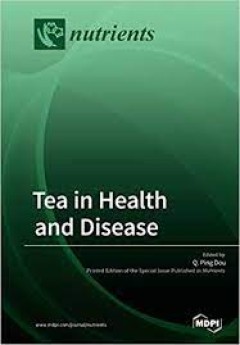
Tea in Health and Disease
Tea, made from the leaves of the Camellia senenisis plant, is the second most consumed beverage worldwide after water. Accumulating evidence from cellular, animal, epidemiological and clinical studies have linked tea consumption to various health benefits, such as chemoprevention of cancers, chronic inflammation, heart and liver diseases, diabetes, neurodegenerative diseases, etc. Although such…
- Edition
- -
- ISBN/ISSN
- 978-3-03897-987-6
- Collation
- -
- Series Title
- -
- Call Number
- 572 TEA
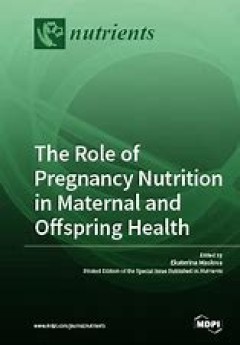
The Role of Pregnancy Nutrition in Maternal and Offspring Health
In pregnancy, maternal nutrition sustains and nourishes the developing child. Imbalances in either the direction of nutritional excess or deficiency can have adverse consequences for child health. In addition, more research now suggests that good pregnancy nutrition influences child health beyond pregnancy and delivery. This includes modifying the risk of child health outcomes as they enter chi…
- Edition
- -
- ISBN/ISSN
- 978-3-03921-997-1
- Collation
- -
- Series Title
- -
- Call Number
- 613 ROL

Application of Essential Oils in Food Systems
This Special Issue will look at the advances made in the essential oils. Essential oils have received increasing attention as natural additives for the shelf-life extension of food products, due to the risk in using synthetic preservatives. Synthetic additives can reduce food spoilage, but the present generation is very health conscious and believes in natural products rather than synthetic one…
- Edition
- -
- ISBN/ISSN
- 978-3-03897-048-4
- Collation
- -
- Series Title
- -
- Call Number
- 572 APP

Benefits of Resveratrol Supplementation
Resveratrol (3,5,4’-trihydroxy-trans-stilbene) is a phytoalexin that belongs to the group of stilbenes. Some plants produce resveratrol in response to infection, stress, injury, or ultraviolet radiation. Resveratrol is also found in grapes, wine, grape juice, peanuts, and some berries, such as blueberries, bilberries, and cranberries. Moreover, the glucosides of resveratrol are also widely re…
- Edition
- -
- ISBN/ISSN
- 978-3-03921-276-7
- Collation
- -
- Series Title
- -
- Call Number
- 572 BEN
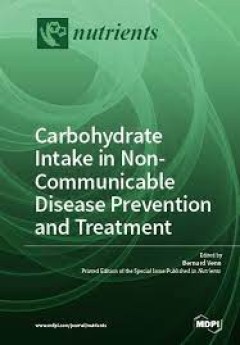
Carbohydrate Intake in Non-communicable Disease Prevention and Treatment
In 2011, carbohydrates provided 63% of the dietary energy intake to the world’s population. Historically, carbohydrate-rich diets have been associated with good health and longevity but there has been a move away from traditional carbohydrate-rich diets, with refined carbohydrate taking much criticism for contributing to non-communicable disease. The aim of this Special Issue is to discuss th…
- Edition
- -
- ISBN/ISSN
- 978-3-03897-819-0
- Collation
- -
- Series Title
- -
- Call Number
- 572 CAR
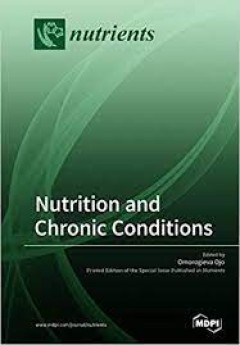
Nutrition and Chronic Conditions
The effects of nutrition in chronic conditions, such as diabetes, cardiovascular disease, dementia, stroke, and inflammatory bowel disease continue to generate interest among researchers. This stems from the fact that diet is a modifiable risk factor for these diseases, which manifest either as single entities or in co-morbid states in individuals and populations around the world. In particular…
- Edition
- -
- ISBN/ISSN
- 978-3-03897-603-5
- Collation
- -
- Series Title
- -
- Call Number
- 572 NUT
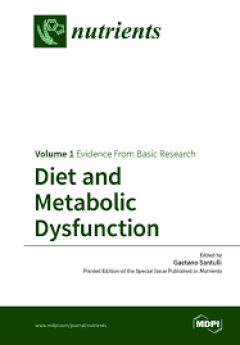
Diet and Metabolic Dysfunction Volume 1 : Evidence From Basic Research
The purpose of these books is to have an updated systematic overview examining, in detail, the functional role of different diets and dietary components in maintaining glucose homeostasis and preventing long-term complications. The first book includes experimental evidence from preclinical research, whereas the second book provides studies in the clinical scenario.
- Edition
- -
- ISBN/ISSN
- 978-3-03842-323-2
- Collation
- -
- Series Title
- -
- Call Number
- 572 DIE
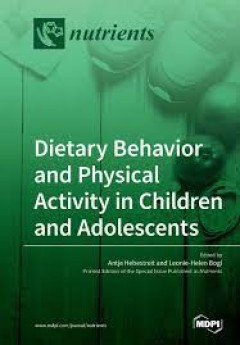
Dietary Behavior and Physical Activity in Children and Adolescents
In recent years, diet- and lifestyle-related disorders have become a major health threat in Europe and worldwide. The contributions in this monograph include 2 review articles and 19 original contributions from several countries that provide new information on the existing research elucidating important aspects of children’s and adolescents’ nutrition and lifestyle behavior. The data includ…
- Edition
- -
- ISBN/ISSN
- 978-3-03921-601-7
- Collation
- -
- Series Title
- -
- Call Number
- 572 DIE
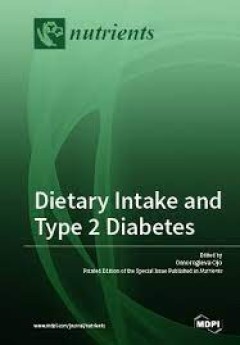
Dietary Intake and Type 2 Diabetes
The prevalence of diabetes is on the increase in the UK and worldwide, partly due to changes in lifestyle which predispose individuals to overweight and obesity. It is estimated that about 90% of the currently diagnosed adults have type 2 diabetes, and based on the World Health Organisation (WHO) report, about 422 million adults were living with diabetes in 2014 compared with 108 million in 198…
- Edition
- -
- ISBN/ISSN
- 978-3-03921-705-2
- Collation
- -
- Series Title
- -
- Call Number
- 572 DIE

Health-Promoting Components of Fruits and Vegetables in Human Health
Diet and lifestyle choices can substantially predispose an individual to, or protect against, many age- and obesity-related chronic diseases. According to the NIH Office of Dietary Supplements, dietary bioactives arecompounds in foodsnot needed for basic human nutrition but responsible for changes in health status.1 These compounds are safe at normal food consumption levels (e.g., anthocyanins …
- Edition
- -
- ISBN/ISSN
- 978-3-03842-629-5
- Collation
- -
- Series Title
- -
- Call Number
- 572 HEA
 Computer Science, Information & General Works
Computer Science, Information & General Works  Philosophy & Psychology
Philosophy & Psychology  Religion
Religion  Social Sciences
Social Sciences  Language
Language  Pure Science
Pure Science  Applied Sciences
Applied Sciences  Art & Recreation
Art & Recreation  Literature
Literature  History & Geography
History & Geography